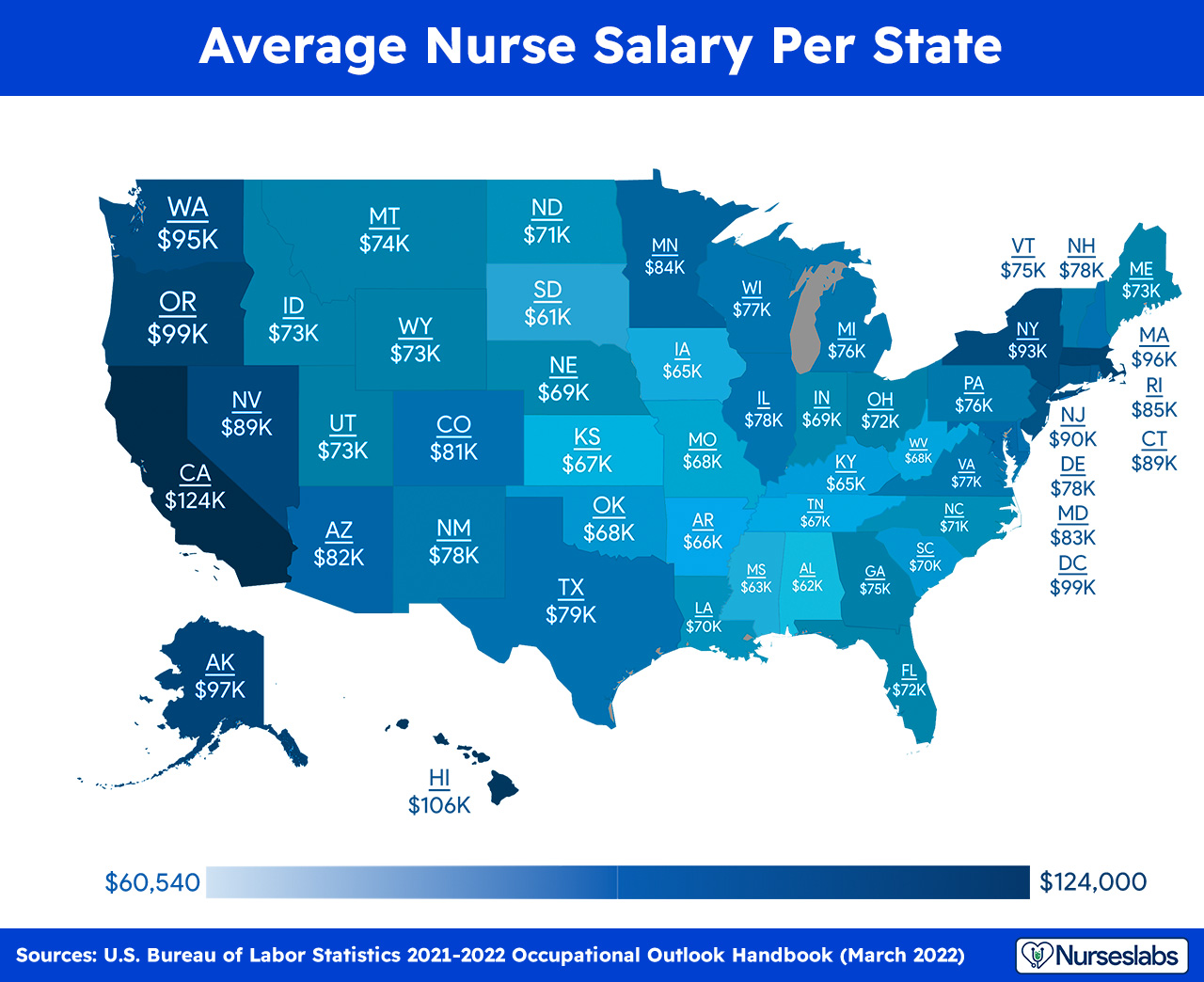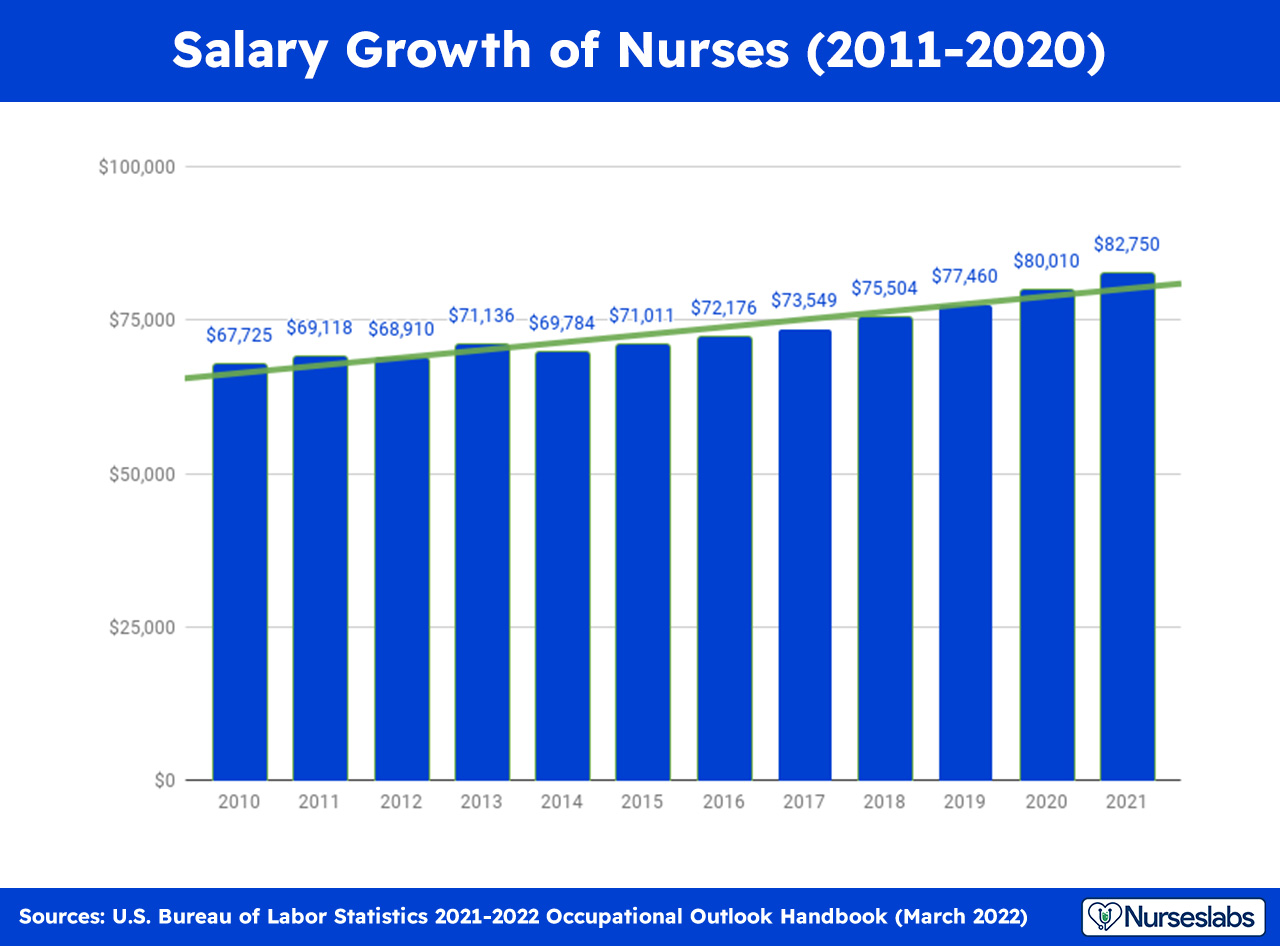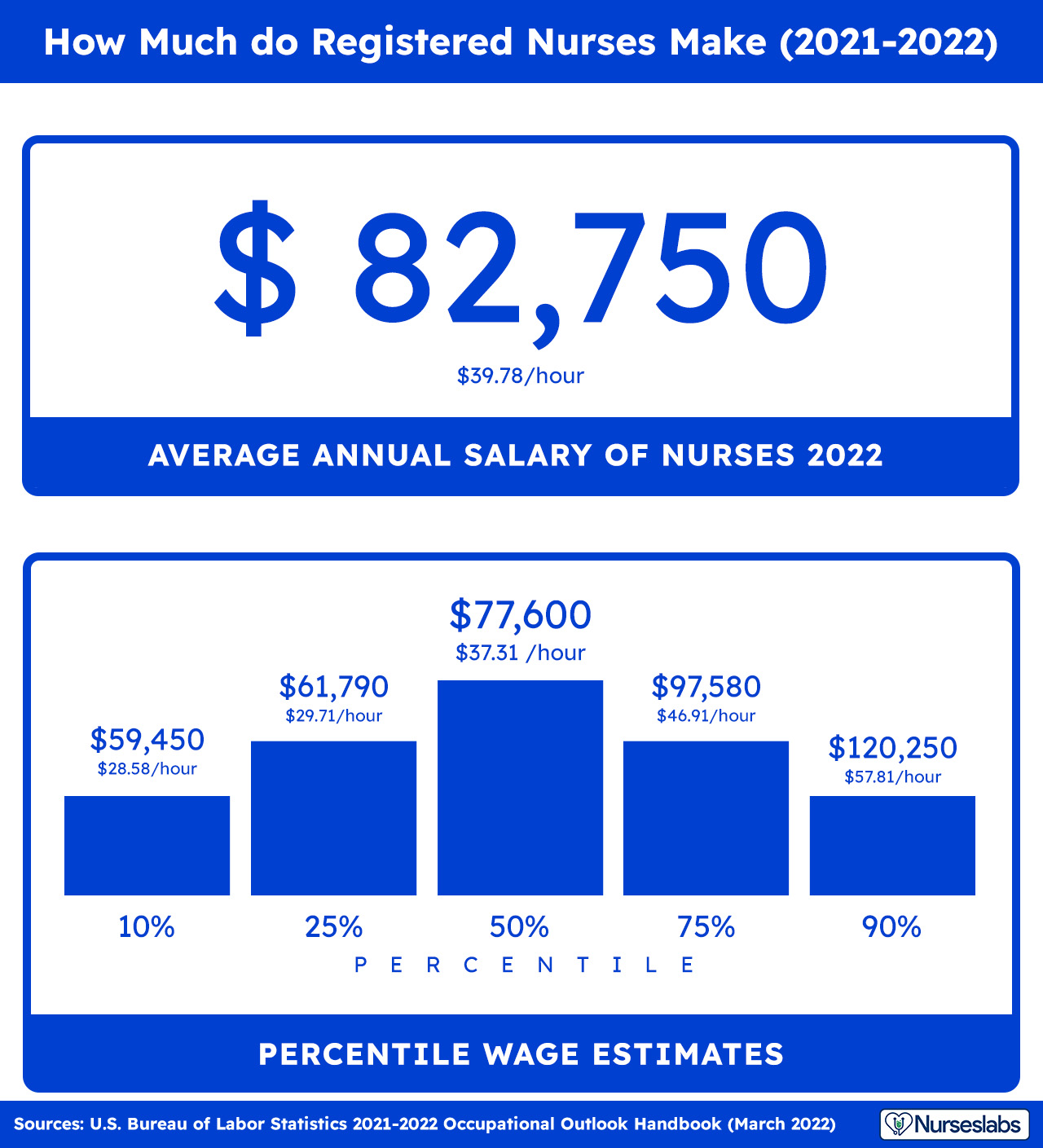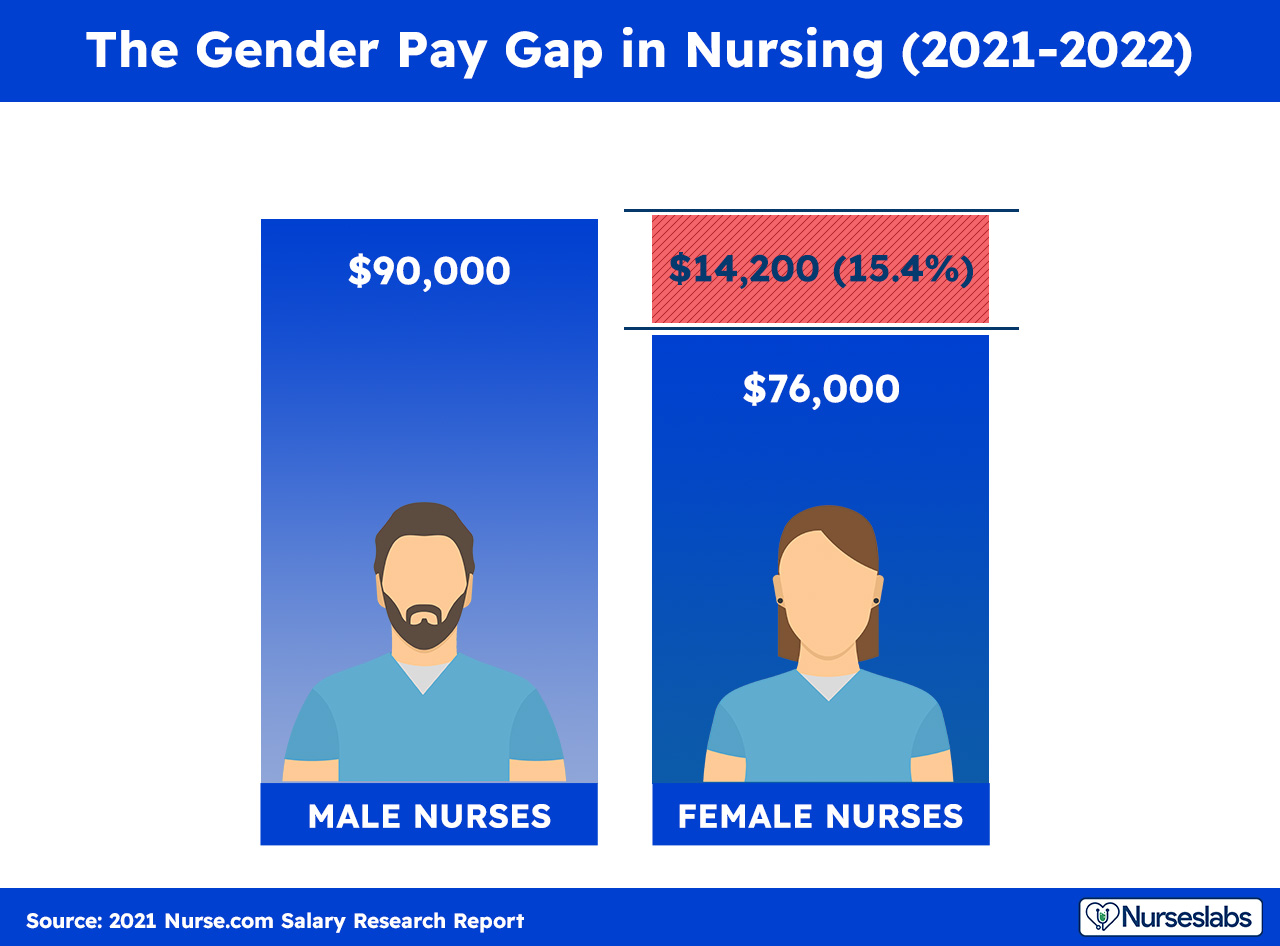For 2021-2022 the salaries of registered nurses in the United States average at $82,750 per year or $39.78 per hour. They also earn well above the average for all U.S. employees, and U.S. nurse salaries are among the best and highest in the world. However, years of experience, qualifications, nursing position, type, state, and employer are all factors that influence the individual nurse’s salary.
The salaries of registered nurses in the U.S. are this article’s focus. This discussion can serve as a guide to help you grow your nursing career and help you understand the factors that will help you decide on what to study, where to apply for a nursing job, and steps you can take to earn more or whether you should negotiate for better pay.
How much do Registered Nurses make?
According to the Bureau of Labor Statistics (BLS), the national average salary for registered nurses (RNs) in the U.S. was $82,750, or $ 39.78 per hour in 2021. The data was released in March 2022.
The average hourly wage of a registered nurse increased by $1.30 compared to the figures released in 2021 – a substantial growth of 3.3%. These figures represent RNs at all levels (from those just starting their nursing careers to nurses with years of experience and in top positions). This data excludes high-earning nurse practitioners, nurse midwives, and nurse anesthetists, who are reported separately in the BLS data.
For 2021-2022, the average salary of a registered nurse is $82,750. How does yours compare?Click to PostThere is a large variation in RN salaries, with the lowest 10% earning $59,000 or $28.58 per hour, while the top 10% earned $120,000 or $57.81 per hour.
Which states pay the best nurse salaries?
The state you work in will make a difference in what you earn as a registered nurse. The average between states varies from the lowest at $60,540 to more than double for the highest paying state at $124,000. According to the BLS data, California, Hawaii, Oregon, the District of Columbia, and Alaska are the highest paying states.

However, it would help to consider the cost of living in a particular state and factor in the buying power of each dollar you earn. So to allow for comparison, we have provided the regional price parities (RPP) for each state in the table below, which shows the number of R.N.s employed in each state and what they earn. The RPP is a percentage of the cost of living in each state compared to national price levels. In terms of the RPP, you can do about the same with a salary of $110,000 in New York (RPP 110.2) and a salary of $88,000 in Kentucky (RPP 89.8).
| STATE | #RNs | ANNUAL | HOURLY | RPP |
|---|---|---|---|---|
| Alabama | 49,780 | $61,920 | $30 | 89.30 |
| Alaska | 6,060 | $97,230 | $47 | 103.20 |
| Arizona | 57,260 | $81,600 | $39 | 99.10 |
| Arkansas | 26,320 | $65,810 | $32 | 89.20 |
| California | 324,400 | $124,000 | $60 | 110.40 |
| Colorado | 51,680 | $80,670 | $39 | 102.90 |
| Connecticut | 34,320 | $88,530 | $43 | 103.40 |
| Delaware | 11,760 | $77,760 | $37 | 97.90 |
| DC | 11,540 | $98,540 | $47 | 111.50 |
| Florida | 187,920 | $72,000 | $35 | 100.70 |
| Georgia | 78,290 | $75,380 | $36 | 94.50 |
| Hawaii | 11,110 | $106,530 | $51 | 112.00 |
| Idaho | 14,400 | $73,640 | $35 | 91.20 |
| Illinois | 129,260 | $78,260 | $38 | 100.50 |
| Indiana | 66,800 | $68,890 | $33 | 92.50 |
| Iowa | 32,650 | $64,990 | $31 | 91.00 |
| Kansas | 28,980 | $66,560 | $32 | 92.40 |
| Kentucky | 43,540 | $67,260 | $32 | 89.80 |
| Louisiana | 42,870 | $70,380 | $34 | 92.70 |
| Maine | 14,380 | $73,630 | $35 | 96.80 |
| Maryland | 51,550 | $82,660 | $40 | 106.50 |
| Massachusetts | 88,270 | $96,630 | $46 | 107.40 |
| Michigan | 102,480 | $75,930 | $37 | 94.00 |
| Minnesota | 69,000 | $84,030 | $40 | 98.60 |
| Mississippi | 29,140 | $63,130 | $30 | 87.80 |
| Missouri | 69,240 | $67,790 | $33 | 92.50 |
| Montana | 9,640 | $73,610 | $35 | 92.40 |
| Nebraska | 20,660 | $69,850 | $34 | 92.90 |
| Nevada | 24,590 | $88,800 | $43 | 97.10 |
| New Hampshire | 12,890 | $78,270 | $38 | 103.70 |
| New Jersey | 77,980 | $89,690 | $43 | 111.20 |
| New Mexico | 17,030 | $77,590 | $37 | 91.60 |
| New York | 188,300 | $93,320 | $45 | 110.20 |
| North Carolina | 104,810 | $71,200 | $34 | 91.80 |
| North Dakota | 11,810 | $71,200 | $34 | 92.00 |
| Ohio | 129,270 | $71,640 | $34 | 91.70 |
| Oklahoma | 31,510 | $68,180 | $33 | 91.30 |
| Oregon | 37,780 | $98,630 | $47 | 102.60 |
| Pennsylvania | 149,270 | $76,000 | $37 | 97.60 |
| Rhode Island | 10,860 | $85,270 | $41 | 101.80 |
| South Carolina | 46,160 | $69,580 | $33 | 91.60 |
| South Dakota | 14,140 | $60,540 | $29 | 91.50 |
| Tennessee | 62,250 | $66,680 | $32 | 92.20 |
| Texas | 217,630 | $79,120 | $38 | 99.50 |
| Utah | 23,760 | $72,790 | $35 | 95.30 |
| Vermont | 7,210 | $75,160 | $36 | 99.30 |
| Virginia | 66,980 | $76,680 | $37 | 101.00 |
| Washington | 62,470 | $95,350 | $46 | 107.40 |
| West Virginia | 19,800 | $67,640 | $33 | 88.00 |
| Wisconsin | 62,860 | $76,850 | $37 | 93.20 |
| Wyoming | 4,890 | $73,130 | $35 | 92.30 |
Do BSN-qualified Registered Nurses earn more than ADN-qualified nurses?
You may be wondering which nursing course to apply for and if it is worth qualifying as an R.N. with a 4-year Bachelor of Science in Nursing (BSN), which costs much more in time and money than a 2-year Associate Degree in Nursing (ADN)?
According to data provided by Payscale, there is a difference in the salaries between BSN and ADN qualified registered nurses. BSN qualified nurses earn on average $89,000 per year compared to $68,000 for ADN qualified registered nurses. Today, many hospitals in the U.S. appoint only BSN nurses, so BSN nurses enjoy better job opportunities. They are also more likely to be promoted and can specialize through postgraduate study.
On the other hand, ADN-qualified nurses usually have less student debt. Furthermore, they can start working sooner and then study part-time and online for a BSN.
What salary can I expect as a newly qualified Registered Nurse?
According to Salary.com, which gathers salary data provided by employers, the average salary for newly graduated nurses with an ADN ranges from $61,000 to $65,000, and that of BSN nurses from $62,000 to $66,000.
So there is not a big difference in starting salaries. But because BSN nurses have better job prospects and more opportunities for advancement, the salary gap widens after a few years of experience.
Do male nurses earn more than female nurses?
There is a gender pay gap in nursing, even though 87% are women. Nurse.com’s survey conducted towards the end of 2021 found that the gender pay gap for registered nurses had widened compared to their 2020 survey. Female registered nurses reported a median baseline salary of $76,000 compared to $90,000 for males. Thus male nurses earned on average $14,200 per year more than female nurses – a 15.4% difference. The gap in the 2020 nurse salary survey was $7,000, or 9%.
Note, however, that this survey only included 2,516 nurses. Possible reasons for the pay gap are that males are more likely to negotiate their salaries and that more males than females work full time and in settings and specialties where there is high demand.
Salary comparison between Registered Nurses and other nurses
How do registered nurse salaries compare to others? The infographic below shows the average annual salaries for different types of nurses.

The BLS data for nurse-midwives may not be fully representative as there was no information available for 15 of the U.S. states. This might explain why their average annual earnings for 2021 were lower than the previous year.
Certified registered nurse anesthetists remain the most highly paid nurses, earning considerably more than all other nurses.
Nurse practitioners are registered nurses specializing in additional postgraduate qualifications at the master’s or doctoral level. Ranked at #2 in the U.S. Today 100 Best Jobs of 2022, nurse practitioners work independently or as part of a healthcare team to diagnose and treat acute, episodic, or chronic illnesses. During the COVID epidemic, the demand for nurse practitioners increased, and many additional U.S. states granted them the right to practice independently.
Nurse instructors are responsible for teaching nursing students in the classroom and during clinical placements. They mostly require advanced qualifications, but their average income compares poorly with nurse practitioners.
A shortage of nurse educators is a major factor contributing to the shortage of nurses. Hence, it is unfortunate that their average salary dropped below that of registered nurses last year. However, it is unclear who exactly is recorded as nurse educators in the BLS data.
Salary comparison between Registered Nurses and other careers
The average salaries earned by registered nurses compare very well with the overall U.S. national salary average of $58,000 per year or $28,01 per hour.
Compared to professional health care careers in general, however, registered nurses earn slightly less than the average of $91,000 per year, or $43.80 per hour.
However, this group includes very high earners like medical specialists. This is reflected in the considerable gap between the average (mean) income and the median – that is, the point at which half of the group falls below the salary and half above. The median hourly salary for this group is $36.08, which means that nurses with a median salary of $37.31 earn slightly more.
Which employers pay nurses the most?
Your salary as a nurse is also influenced by where and by whom you are employed.
Of the 3,047,530 registered nurses included in the BLS report, the single largest group was employed in general medical and surgical hospitals (31%) with an average annual salary of $85,000. Registered nurses working at outpatient care centers earned more at $93,000 per year.
Nurses working in services with more regular working hours generally earn less Those working in offices of physicians earn around $74,000 per year, while school nurses earn an average salary of $62,500.
Some industries paid considerably more than the average. Nurses who work for the federal government instead of state or local governments earn $97,000 per year. Although they employ very few registered nurses, industries that paid nurses the most were air transportation at $110,000, pharmaceutical and medicine manufacturing at $105,000, and wholesalers at $101,000.
Do average nurse salaries increase over time?
The salaries of registered nurses grew by an average of 1.9% per year from 2012 to 2021. However, in 2020 and 2021, salaries increased by 3.29% and 3.42%, respectively, due to the increased demand created by the Covid-19 pandemic.

Salaries are bound to keep rising steadily in the years because demand drives pay. The BLS projects that the number of nursing jobs will grow at 9% per year between 2020 and 2030 and that there will be 194,500 openings for registered nurses yearly.
Salary growth of registered nurses from 2007 to 2021
| YEAR | PER HOUR | SALARY | GROWTH | %GROWTH |
|---|---|---|---|---|
| 2007 | $30.04 | $62,483 | – | – |
| 2008 | $31.31 | $65,125 | $2,642 | 4.06% |
| 2009 | $31.99 | $66,539 | $1,414 | 2.13% |
| 2010 | $32.56 | $67,725 | $1,186 | 1.75% |
| 2011 | $33.23 | $69,118 | $1,394 | 2.02% |
| 2012 | $33.13 | $68,910 | -$208 | -0.30% |
| 2013 | $34.20 | $71,136 | $2,226 | 3.13% |
| 2014 | $33.55 | $69,784 | -$1,352 | -1.94% |
| 2015 | $34.14 | $71,011 | $1,227 | 1.73% |
| 2016 | $34.70 | $72,176 | $1,165 | 1.61% |
| 2017 | $35.36 | $73,549 | $1,373 | 1.87% |
| 2018 | $36.30 | $75,504 | $1,955 | 2.59% |
| 2019 | $37.24 | $77,460 | $1,956 | 2.53% |
| 2020 | $38.47 | $80,010 | $2,550 | 3.19% |
| 2021 | $39.78 | $82,750 | $2,740 | 3.31% |
| AVERAGE TOTAL | $34.40 | $71,552 | $1,351 | 1.79% |
Factors contributing to the need for more nurses include the existing shortage of nurses, a greater demand for preventive and high-tech services, the aging population, and the increase in chronic conditions.
Nursing is still a top career choice in the U.S.
The career of registered nurse is ranked 12th in the U.S. News Best Jobs for 2022 and registered nurses’ salaries compare favorably with similar careers.
Furthermore, many local governments and employers are currently taking proactive steps to attract and retain more nurses to address the shortages worsened by the Covid-19 pandemic. Some of these steps, like sign-on bonuses and loan forgiveness, may put more money in nurses’ pockets.
While many different factors determine nurse salaries there are steps you can take to earn more year-on-year. Commitment and hard work usually gain recognition, as does expertise in a specific field which you can get with experience and focused continuing education.
Furthermore, always be prepared to negotiate your salary. Think through what you deserve and how you can show that you are worth more – and then ask for it.



I have concerns about the rationale for the gender pay gap. While yes male nurses only make up about 14 % of the working nursing population, approximately 41% of male nurses, according to the American Nurses Association in 2021, were nurse anesthetists. When almost half of all male nurses work in the highest-paid specialty, then yes, there will be a perception of a gender pay gap.
I would rather see a comparison of the genders by specialty to truly assess for a gender pay gap.